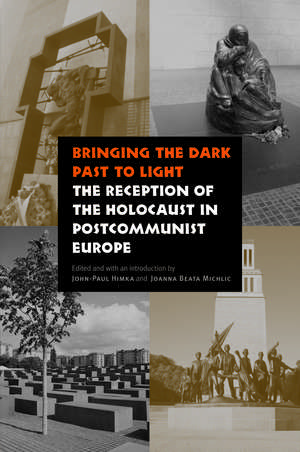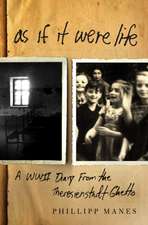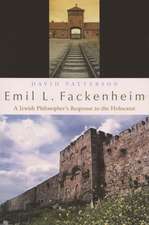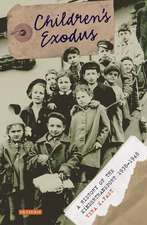Bringing the Dark Past to Light: The Reception of the Holocaust in Postcommunist Europe
Editat de John-Paul Himka, Joanna Beata Michlicen Limba Engleză Hardback – 30 iun 2013
This volume of original essays explores the memory of the Holocaust and the Jewish past in postcommunist Eastern Europe. Devoting space to every postcommunist country, the essays in Bringing the Dark Past to Light explore how the memory of the “dark pasts” of Eastern European nations is being recollected and reworked. In addition, it examines how this memory shapes the collective identities and the social identity of ethnic and national minorities. Memory of the Holocaust has practical implications regarding the current development of national cultures and international relationships.
Preț: 425.37 lei
Nou
Puncte Express: 638
Preț estimativ în valută:
81.40€ • 84.47$ • 68.04£
81.40€ • 84.47$ • 68.04£
Carte tipărită la comandă
Livrare economică 17-31 martie
Preluare comenzi: 021 569.72.76
Specificații
ISBN-13: 9780803225442
ISBN-10: 080322544X
Pagini: 792
Ilustrații: 6 photographs
Dimensiuni: 152 x 229 x 57 mm
Greutate: 1.29 kg
Editura: Nebraska
Colecția University of Nebraska Press
Locul publicării:United States
ISBN-10: 080322544X
Pagini: 792
Ilustrații: 6 photographs
Dimensiuni: 152 x 229 x 57 mm
Greutate: 1.29 kg
Editura: Nebraska
Colecția University of Nebraska Press
Locul publicării:United States
Notă biografică
John-Paul Himka is a professor of history and classics at the University of Alberta. He is the author of Last Judgment Iconography in the Carpathians. Joanna Beata Michlic is the director and founder of the Hadassah–Brandeis Institute Project on Families, Children, and the Holocaust at Brandeis University and is the author of Poland’s Threatening Other (Nebraska, 2006).
Cuprins
List of Illustrations
Preface and Acknowledgments
Introduction
John-Paul Himka and Joanna Beata Michlic
1. "Our Conscience Is Clean": Albanian Elites and the Memory of the Holocaust in Postsocialist Albania
Daniel Perez
2. The Invisible Genocide: The Holocaust in Belarus
Per Anders Rudling
3. Contemporary Responses to the Holocaust in Bosnia and Herzegovina
Francine Friedman
4. Debating the Fate of Bulgarian Jews during World War II
Joseph Benatov
5. Representations of the Holocaust and Historical Debates in Croatia since 1989
Mark Biondich
6. The Sheep of Lidice: The Holocaust and the Construction of Czech National History
Michal Frankl
7. Victim of History: Perceptions of the Holocaust in Estonia
Anton Weiss-Wendt
8. Holocaust Remembrance in the German Democratic Republic--and Beyond
Peter Monteath
9. The Memory of the Holocaust in Postcommunist Hungary
Part 1: The Politics of Holocaust Memory
Paul Hanebrink
Part 2: Cinematic Memory of the Holocaust
Catherine Portuges
10. The Transformation of Holocaust Memory in Post-Soviet Latvia
Bella Zisere
11. Conflicting Memories: The Reception of the Holocaust in Lithuania
Saulius Sužied<edot>lis and Šarūnas Liekis
12. The Combined Legacies of the "Jewish Question" and the "Macedonian Question"
Holly Case
13. Public Discourses on the Holocaust in Moldova: Justification, Instrumentalization, and Mourning
Vladimir Solonari
14. The Memory of the Holocaust in Post-1989 Poland: Renewal--Its Accomplishments and Its Powerlessness
Joanna B. Michlic and Małgorzata Melchior
15. Public Perceptions of the Holocaust in Postcommunist Romania
Felicia Waldman and Mihai Chioveanu
16. The Reception of the Holocaust in Russia: Silence, Conspiracy, and Glimpses of Light
Klas-Göran Karlsson
17. Between Marginalization and Instrumentalization: Holocaust Memory in Serbia since the Late 1980s
Jovan Byford
18. The "Unmasterable Past"? The Reception of the Holocaust in Postcommunist Slovakia
Nina Paulovičová
19. On the Periphery: Jews, Slovenes, and the Memory of the Holocaust
Gregor Joseph Kranjc
20. The Reception of the Holocaust in Postcommunist Ukraine
John-Paul Himka
Conclusion
Omer Bartov
Contributors
Index
Preface and Acknowledgments
Introduction
John-Paul Himka and Joanna Beata Michlic
1. "Our Conscience Is Clean": Albanian Elites and the Memory of the Holocaust in Postsocialist Albania
Daniel Perez
2. The Invisible Genocide: The Holocaust in Belarus
Per Anders Rudling
3. Contemporary Responses to the Holocaust in Bosnia and Herzegovina
Francine Friedman
4. Debating the Fate of Bulgarian Jews during World War II
Joseph Benatov
5. Representations of the Holocaust and Historical Debates in Croatia since 1989
Mark Biondich
6. The Sheep of Lidice: The Holocaust and the Construction of Czech National History
Michal Frankl
7. Victim of History: Perceptions of the Holocaust in Estonia
Anton Weiss-Wendt
8. Holocaust Remembrance in the German Democratic Republic--and Beyond
Peter Monteath
9. The Memory of the Holocaust in Postcommunist Hungary
Part 1: The Politics of Holocaust Memory
Paul Hanebrink
Part 2: Cinematic Memory of the Holocaust
Catherine Portuges
10. The Transformation of Holocaust Memory in Post-Soviet Latvia
Bella Zisere
11. Conflicting Memories: The Reception of the Holocaust in Lithuania
Saulius Sužied<edot>lis and Šarūnas Liekis
12. The Combined Legacies of the "Jewish Question" and the "Macedonian Question"
Holly Case
13. Public Discourses on the Holocaust in Moldova: Justification, Instrumentalization, and Mourning
Vladimir Solonari
14. The Memory of the Holocaust in Post-1989 Poland: Renewal--Its Accomplishments and Its Powerlessness
Joanna B. Michlic and Małgorzata Melchior
15. Public Perceptions of the Holocaust in Postcommunist Romania
Felicia Waldman and Mihai Chioveanu
16. The Reception of the Holocaust in Russia: Silence, Conspiracy, and Glimpses of Light
Klas-Göran Karlsson
17. Between Marginalization and Instrumentalization: Holocaust Memory in Serbia since the Late 1980s
Jovan Byford
18. The "Unmasterable Past"? The Reception of the Holocaust in Postcommunist Slovakia
Nina Paulovičová
19. On the Periphery: Jews, Slovenes, and the Memory of the Holocaust
Gregor Joseph Kranjc
20. The Reception of the Holocaust in Postcommunist Ukraine
John-Paul Himka
Conclusion
Omer Bartov
Contributors
Index
Recenzii
"This pioneering work in the field of Holocaust studies should be a part of any library with even the most modest of holdings about the Shoah."—David M. Crowe, Journal of Interdisciplinary History
"The manner in which Nazi-occupied nations have responded to the Holocaust since the fall of communism is a subject of no small importance. Fortunately, Bringing The Dark Past To Light addresses this topic seriously and comprehensively."—Sheldon Kirshner, Times of Israel
"A remarkable collection."—Kelly McFall, New Books in Genocide Studies
"This is a magnificent work of scholarship. The essays in this substantial book provide models of balance and rectitude."—Patterns of Prejudice
“An excellent collection that addresses a very timely topic and fills a real gap in our knowledge. It will be of interest not only to specialists on the Holocaust but also to anyone—specialist and nonspecialist alike—interested in the issues and problems of postcommunist Europe.”—Samuel Kassow, professor of history at Trinity College and author of Who Will Write Our History? Rediscovering a Hidden Archive from the Warsaw Ghetto
“An extraordinary volume and a feat of editorial ingenuity. . . . No matter what you know or think about contemporary Europe and the politics of Holocaust memory, you will be enlightened and surprised by this remarkable book.”—Doris L. Bergen, Chancellor Rose and Ray Wolfe Professor of Holocaust Studies, University of Toronto, and author of War and Genocide: A Concise History of the Holocaust












